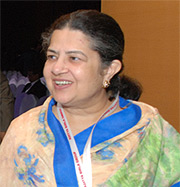Aditya Birla Centre for Community Initiatives and Rural Development
12 August, 2013 | CII
Share For over 50 years now, the Aditya Birla Group have been and continue to be involved in meaningful, welfare driven initiatives that distinctively impact the quality of life of the rural poor. The vision is to actively contribute to the social and economic development of the communities in which we operate, in so doing build better sustainable way of life for the weaker sections of the society and raise the country's human development index.
For over 50 years now, the Aditya Birla Group have been and continue to be involved in meaningful, welfare driven initiatives that distinctively impact the quality of life of the rural poor. The vision is to actively contribute to the social and economic development of the communities in which we operate, in so doing build better sustainable way of life for the weaker sections of the society and raise the country's human development index.
Our footprint
The footprint of our community work straddles 2,500 villages. In working with the communities, they gauge what their real needs are.
Of the 2,500 villages that, we are engaged in, we have zeroed in on 300 villages, which we hope to morph into model villages. Making of a Model Village entails ensuring self-reliance in all aspects viz., education, healthcare and family welfare, infrastructure, agriculture and watershed management, and working towards sustainable livelihood patterns. Fundamentally, ensuring that their development reaches a stage wherein village committees take over the complete responsibility and the teams become dispensable. It is against this backd;rop that one will dwell on the Group's experience in sanitation.
Water – the life force, integral to sanitation
The Foundation has been providing water on a continual basis to the villages that are in proximity to their plants. But this is for their basic needs. With water scarcity, open spaces seemed perhaps the only option to the villagers. Hence to tackle the issues related to sanitation, we had to first grapple with the challenge of tapping new avenues of water.
For this, the Foundation evolved a multi - pronged strategy based on an integral development plan. Various schemes of the Government viz., Swajaldhara Yojana, Jalnidhi, Rajiv Gandhi National Drinking Water Scheme, and many more were used and these schemes enabled them to extend their reach as catalysts benefitting thousand of villagers.
Changing mindsets
The second plank of our strategy entailed a massive awareness drive on cleanliness linking it with hygiene and sanitation. District Authorities and NGOs were roped in this endeavour to sensitize and persuade the villagers.
The Foundation recoursed to 'Nukkad Nataks" (street level plays) and puppet shows to drive messages linking hygiene and good health to sanitation. It was highlighted how they could prevent water borne and sanitation diseases from occurring and spreading, if we were able to have toilet blocks in the villages.
Energizing the Villagers
The fourth plank was to get this movement going amongst the villagers. In the village of Devari (Renukoot, Uttar Pradesh), the campaign was started in a creative way. Using the platform, of the Panchayat General Meeting, the Foundation began energizing the villagers by highlighting how Devari can be positioned on the map of UP, if it received the President's Award under the Nirmal Gram Yojana. The thought of acquiring this fame was a great booster. This did help, and a year down the line, the Devari Pradhan did receive this Award.
Towards good hygiene
Of the 300 model villages that the Foundation is engaged in, 60 have already reached the level of model villages and most of these have reasonable sanitation facilities. Of these - Hiple Station in Maharashtra; Balanivav, Kagvadar, Asarma, Balota in Gujarat, IIav in Bharuch, Malkhed and Dandoti in Karnataka, Nayan and Takrawda in Nagda – MP; Sawa, Naadsar and Arniyapan Panchayat in Rajasthan; Kesarpura, Damodarpura, Khor in Madhya Pradesh; Devari and Parasi in Sonebhadra District in Renukoot, Uttar Pradesh; Bagru in Lohardaga - Jharkhand, Naickerpalayam, Chitteri, Thandalam, Parithiputhur, Papamkuppam and Echankadu (Gummidipondi), Tamil Nadu, have attained 100% sanitation. In fact the Government of Tamil Nadu on their website has commended our Carbon Black Plant - Hi-Tech Carbon at Gummidipondi for its work in this domain (Reference - Total Sanitation Campaign, Tiruvallur District, Tamil Nadu State, construction of Toilets through Corporate Sectors - Success Story). They have showcased the Group as a case study.






